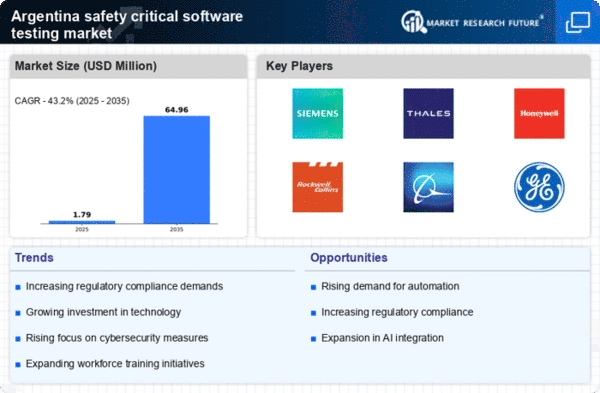Rising Cybersecurity Threats
The increasing prevalence of cybersecurity threats poses a significant challenge to the safety critical-software-testing market. In Argentina, organizations are becoming more aware of the vulnerabilities associated with software systems, particularly in sectors such as finance and healthcare. The need for robust security measures is driving the demand for comprehensive testing solutions that address potential cyber threats. As a result, companies are investing in specialized testing services to identify and mitigate risks, which is expected to propel the market forward. The safety critical-software-testing market is likely to see a surge in demand for services that incorporate cybersecurity testing, reflecting the growing recognition of the importance of safeguarding sensitive data and ensuring system integrity.
Increased Focus on Quality Assurance
The heightened focus on quality assurance in software development is a key driver for the safety critical-software-testing market. In Argentina, businesses are recognizing the critical role that quality plays in the success of their software products. This awareness is leading to increased investments in testing processes to ensure that software meets the highest standards of reliability and performance. The market is witnessing a shift towards adopting best practices in quality assurance, which includes comprehensive testing strategies that encompass various testing methodologies. As organizations strive to enhance their product offerings, the safety critical-software-testing market is expected to grow, driven by the demand for quality assurance solutions that align with industry standards and customer expectations.
Increasing Demand for Safety Standards
The rising emphasis on safety standards in various sectors, particularly in transportation and healthcare, drives the safety critical-software-testing market. In Argentina, regulatory bodies are enforcing stricter compliance measures, which necessitate rigorous testing of software systems. This trend is evident as industries seek to mitigate risks associated with software failures. The market is projected to grow at a CAGR of approximately 8% over the next five years, reflecting the increasing investment in safety-critical software solutions. Companies are compelled to adopt comprehensive testing methodologies to ensure compliance with national and international safety regulations, thereby enhancing the reliability of their products. As a result, the safety critical-software-testing market is likely to witness substantial growth fueled by the demand for adherence to safety standards.
Technological Advancements in Testing Tools
Technological innovations are reshaping the landscape of the safety critical-software-testing market. In Argentina, the integration of advanced testing tools, such as artificial intelligence and machine learning, is becoming prevalent. These technologies enhance the efficiency and accuracy of testing processes, allowing for more thorough evaluations of software systems. The market is experiencing a shift towards automated testing solutions, which can reduce testing time by up to 30%. This shift not only streamlines the testing process but also minimizes human error, which is crucial in safety-critical applications. As organizations increasingly adopt these technologies, the safety critical-software-testing market is expected to expand, driven by the need for more sophisticated testing methodologies that align with modern software development practices.
Growing Investment in Infrastructure Projects
Argentina's ongoing investment in infrastructure projects significantly impacts the safety critical-software-testing market. The government is allocating substantial funds to enhance transportation, energy, and healthcare infrastructure, which necessitates the development of reliable software systems. As these projects progress, the demand for safety-critical software testing becomes paramount to ensure the integrity and safety of the systems involved. The market is projected to benefit from this trend, with an estimated growth of 10% in the next few years as more projects come online. This investment not only boosts the economy but also emphasizes the importance of rigorous testing protocols to prevent failures that could have catastrophic consequences. Consequently, the safety critical-software-testing market is likely to thrive in response to these infrastructure developments.
















